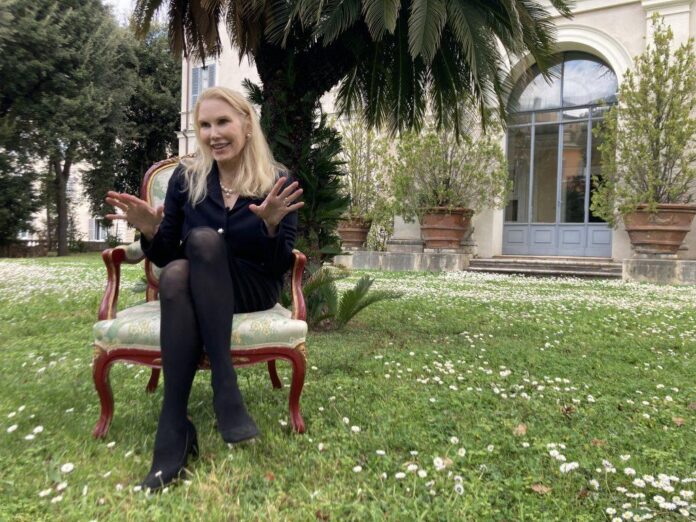In the latest in a protracted legal battle, police escorted Princess Rita Jenrette Boncompagni Ludovisi from her home at Rome’s Casino di Villa Boncompagni Ludovisi, or the Villa Aurora—home to the world’s only known Caravaggio ceiling mural—in compliance with a court-ordered eviction.
“This is so illegal,” Princess Rita said in a Twitter video recorded shortly before her eviction. “It’s incomprehensible what they’re doing.”
In January, Judge Miriam Iappelli rule that Princess Rita had violated a court order prohibiting her from giving tours of the villa, and had failed to properly maintain the 9,000-square-foot property. The eviction notice cited damage to the balustrade of an exterior garden wall that had forced the closure of a public street.
Princess Rita has said that paid tours were necessary to pay for the upkeep of the 11-bedroom villa.
A native Texan born Rita Carpenter, the 73-year-old became European royalty when she married Prince Nicolò Boncompagni Ludovisi in 2009. The couple worked together on an extensive renovation of the Villa Aurora, a 1570 hunting lodge that had been in the family since 1621.

Caravaggio, Jupiter, Neptune and Pluto (ca. 1597). Collection of the Villa Aurora.
But when Prince Nicolò died in 2018, it sparked a bitter dispute between Princess Rita and his three sons over the fate of the historic property.
In his will, Prince Nicolò made provisions for Princess Rita to remain at the villa until her death. If it was sold, the proceeds were to be split between her and his sons. An Italian court tried to resolve the matter with the villa’s sale, putting it on the market in October 2021 for €471 million ($546 million).
The Villa Aurora has now failed to find a buyer at six auctions, most recently on April 6—even though the asking price had dropped to €108.5 million ($118 million). The next sale, on June 30 at online auction site Fallco Aste, has an asking price of €145 million. The government will have 60 days to match the purchase price of any sale to a private buyer, according to Wanted in Rome.

The Villa Aurora, or Casino di Villa Boncompagni Ludovisi, in Rome. The property, home to the only ceiling mural by Caravaggio, is being auctioned to resolve an inheritance dispute, but has thus far failed to find a buyer. Photo by Vincenzo Pinto/AFP via Getty Images.
Princess Rita had hoped that a buyer might allow her to continue living at the villa even after the sale. Now, that hope has been dashed.
“What did I do to deserve this? It’s a mystery to me—why are they so intent on getting me out of here?” Princess Rita told reporters as she left the premises with her five poodles. She pled her case to the end, speaking with police—who had hired a locksmith to gain access to the property—for two hours before finally agreeing to leave, according to Italian newspaper .
Her youngest stepson, Bante Boncompagni Ludovisi, meanwhile, was watching with triumph as the villa was “liberated,” telling the that his father had been “out of his mind” when he wrote his will, and that the villa rightfully belonged to him and his brothers.
A message from Rita Boncompagni Ludovisi (Thursday 20 April 2023) pic.twitter.com/LDSmIpa6Y6
— Archivio Digitale Boncompagni Ludovisi (@villaludovisi) April 20, 2023
“The princess is now literally homeless with one suitcase, making plans one night at a time,” Corey Brennan, a classics professor at Rutgers University in New Jersey and the villa’s archivist, told Artnet News in a Twitter message. “She also tells me that her bank account has been frozen.”
Vacating her home, Princess Rita took only a few personal effects; the court has ordered that the contents of the villa be “disposed of or destroyed.”
“The Villa Ludovisi first needs to be closed and then renovated,” Bante Boncompagni Ludovisi told . “It therefore needs to be cleared out.”

The wedding photo of Princess Rita and Prince Nicolò Boncompagni Ludovisi at Villa Aurora in Rome. Photo by Marco Mancini, Creative Commons Attribution-Share Alike 3.0 Unported license.
In addition to the home’s famed Caravaggio—a full frontal nude of the Roman god Jupiter with Neptune and Pluto—the villa is home to some 25 oil paintings, including works attributed to Scipione Pulzone, Domenichino, and Ottavio Leoni, as well as a number of antique statues, relief sculptures, and portrait busts, Brennan told the .
Formerly married to South Carolina congressman John W. Jenrette Jr., who was convicted of accepting a bribe in the Abscam scandal, Princess Rita has had previous lives as a romance novelist, country singer, model, and actress. Moving forward, reports, she intends to fight the eviction in Italian court, and possibly the European Court of Human Rights.

























